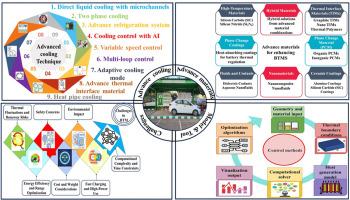Advancements and challenges in battery thermal management for electric vehicles
IF 16.3
1区 工程技术
Q1 ENERGY & FUELS
引用次数: 0
Abstract
Battery thermal management (BTM) is pivotal for enhancing the performance, efficiency, and safety of electric vehicles (EVs). This study explores various cooling techniques and their impacts on EV battery optimization. Improved materials aid in heat dissipation enhancement. Computational models and simulation tools are utilized for BTM in EVs. Results reveal diverse temperature regulation outcomes, emphasizing the significance of cycle rate optimization for sustained battery performance and longevity. Active cooling maintains temperatures between 24.72 °C and 39.84 °C, showcasing effective control within a moderate range. Passive cooling exhibits a slightly broader range (25.83 °C to 41.91 °C), while phase change material (PCM) cooling displays versatility but challenges in precise temperature control (21.55 °C to 49.56 °C). Thermoelectric cooling mirrors active cooling's effectiveness within a moderate span (24.09 °C to 41.81 °C). Hybrid cooling achieves regulation comparable to active and thermoelectric methods (24.36 °C to 42.09 °C), indicating its efficacy in maintaining optimal battery temperatures. These findings underscore the importance of BTM advancement in facilitating EV adoption and success. This study supports the UN SDG 7 (Affordable and Clean Energy) and is also aligned with the targets of Paris Agreement emissions i.e. net zero by 2050.

电动汽车电池热管理的进步与挑战
电池热管理(BTM)对于提高电动汽车(EV)的性能、效率和安全性至关重要。本研究探讨了各种冷却技术及其对电动汽车电池优化的影响。改良材料有助于提高散热性能。计算模型和模拟工具被用于电动汽车的 BTM。结果显示了不同的温度调节结果,强调了循环速率优化对电池性能和使用寿命的重要性。主动冷却将温度保持在 24.72 °C 至 39.84 °C 之间,显示了在中等范围内的有效控制。被动冷却的范围稍宽(25.83 ℃ 至 41.91 ℃),而相变材料 (PCM) 冷却具有多功能性,但在精确温度控制方面存在挑战(21.55 ℃ 至 49.56 ℃)。热电冷却在中等范围内(24.09 °C至41.81 °C)反映了主动冷却的效果。混合冷却的调节效果与主动冷却和热电冷却方法相当(24.36 °C至42.09 °C),表明其在维持最佳电池温度方面的功效。这些发现凸显了 BTM 技术的进步在促进电动汽车的采用和成功方面的重要性。这项研究支持联合国可持续发展目标 7(负担得起的清洁能源),也符合《巴黎协定》的排放目标,即到 2050 年实现净零排放。
本文章由计算机程序翻译,如有差异,请以英文原文为准。
求助全文
约1分钟内获得全文
求助全文
来源期刊

Renewable and Sustainable Energy Reviews
工程技术-能源与燃料
CiteScore
31.20
自引率
5.70%
发文量
1055
审稿时长
62 days
期刊介绍:
The mission of Renewable and Sustainable Energy Reviews is to disseminate the most compelling and pertinent critical insights in renewable and sustainable energy, fostering collaboration among the research community, private sector, and policy and decision makers. The journal aims to exchange challenges, solutions, innovative concepts, and technologies, contributing to sustainable development, the transition to a low-carbon future, and the attainment of emissions targets outlined by the United Nations Framework Convention on Climate Change.
Renewable and Sustainable Energy Reviews publishes a diverse range of content, including review papers, original research, case studies, and analyses of new technologies, all featuring a substantial review component such as critique, comparison, or analysis. Introducing a distinctive paper type, Expert Insights, the journal presents commissioned mini-reviews authored by field leaders, addressing topics of significant interest. Case studies undergo consideration only if they showcase the work's applicability to other regions or contribute valuable insights to the broader field of renewable and sustainable energy. Notably, a bibliographic or literature review lacking critical analysis is deemed unsuitable for publication.
 求助内容:
求助内容: 应助结果提醒方式:
应助结果提醒方式:


